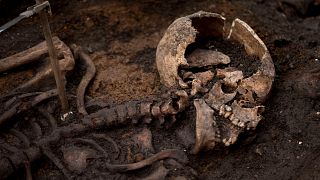Ethiopia
Just a handful of ancient teeth uncovered in Ethiopia is rewriting what we know about human origins.
The fossils, dated between 2.6 and 2.8 million years old, were found at the Ledi-Geraru site in Ethiopia's Afar region, not far from where the famous 'Lucy' skeleton was discovered.
Scientists say the teeth belong to an unknown human ancestor of the Australopithecus species, adding new complexity to the evolutionary story of humanity.
“What makes it special and new is the exciting discovery that there is more diversity in the human lineage, in our origin, in our ancestry, than we originally thought at this particular time", said Amy Rector, a paleoanthropologist and member of the research team that uncovered the fossils.
The Australopithecus is ape-like in appearance but with human characteristics like bipedal walking.
The discovery shows that the species may have existed at the same time as some of the earliest Homo sapiens, challenging the idea that human evolution was a simple, linear process.
"It’s boring if there’s just one evolving into the next one. But if there are three around and they’re overlapping, that makes the questions really great to ask", Rector said.
The researchers say that more fossils are needed before the species can be formally named, but the find sheds new light on a pivotal moment in human's evolutionary past.













00:58
Kenya’s Toroitich wins Amsterdam Marathon
01:14
Ethiopia accuses Eritrea of preparing to wage war against it
02:16
Culture and identity: Oromo Festival reflects Ethiopia's complex shifts
01:00
Pix of the Day: October 02, 2025
Go to video
At least 30 people killed after church collapses in Amhara
01:00
Ethiopia, Niger plan to build nuclear plants with Russia's Rosatom